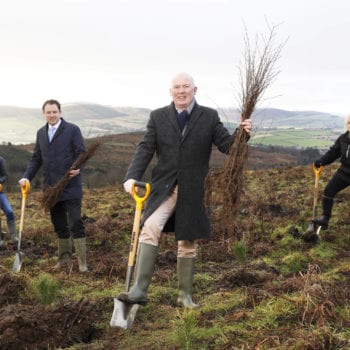Aldi Ireland commits to planting 1 million native Irish woodland trees by 2025

Ministers join Aldi team to plant first of 30,000 trees at Aughrim, Co. Wicklow
26 January 2021
Aldi Ireland has pledged to support the planting of 1 million native Irish woodland trees around Ireland over the next four years as part of a long-term commitment towards the environment.
Aldi is the first retailer in Ireland to commit to this level of partnership with the Department of Agriculture’s Woodland Environment Fund (WEF), which is an initiative under which Irish businesses can partner with landowners and the Department to help create new native woodlands in Ireland. It provides additional incentives to plant new native woodlands and supports the government’s target to plant 22 million new trees a year until 2040.
Representatives from Aldi Ireland were joined by Minister for Agriculture, Food and the Marine Charlie McConalogue, and his colleague Minister-of-State Pippa Hackett to launch the new commitment at Aughrim, Co. Wicklow. Working in conjunction with Green Belt forestry consultancy, Aldi Group managing director Niall O’Connor and the Ministers pulled on their wellies and, with spades in hand, planted the first of what will end up as a total of 30,000 oak, birch and ash trees.
Planting the one million native trees will remove more than 160,000 tonnes of carbon emissions over a 100-year period. To put this in context, this equates to roughly 640 million kilometres driven by an average passenger vehicle (or the emissions from about 400 cars each year), 68 million litres of petrol consumed, or 20 billion smartphones charged, enough to charge all of Ireland’s smartphones almost 47 times over each year.
The native tree plantations will create a wildlife corridor for native species and enable grassland to revert to more natural vegetation, further enhancing biodiversity in the area.
In January of 2020, Aldi announced its involvement in the scheme. To date, over 103,950 trees have been planted, including at Rockfield, Limerick where 16,000 trees were planted. Further plantings took place at sites in Muingaphuca, Co. Kerry, where 15,000 trees were planted, as well as more than 24,600 trees across Co. Mayo, Headford, Co. Galway, where 20,000 trees were planted and the Aughrim, Co. Wicklow site where 30,000 trees were just planted.
Speaking at the event, Minister for Agriculture, Food and the Marine Charlie McConalogue said: “We have set ambitious targets as a country to plant 440 million trees by 2040, equating to 22 million native trees each year. Encouraging our native Irish biodiversity to flourish is highly important, and I am delighted to see a company such as Aldi supporting the Department of Agriculture-led Woodland Environment Fund. It is important that companies and individuals play their part in reducing the amount of carbon we emit, and I commend Aldi and the team for all their hard work.”
Niall O’Connor, Aldi group managing director, said: “We are delighted to support the Government’s objective to plant 22 million trees annually each year until 2040. Aldi is committed to minimising the environmental impact of its business. We are targeting to plant 225,000 trees a year for the next four years which forms part of our wider sustainability strategy.”
Minister Hackett said she was likewise delighted to see Aldi interact with the Woodland Environment Fund. “It’s one which demonstrates the best of public private partnership,” she said, “as it offers firms the opportunity to top up payments to farmers and landowners who commit to Department funded forestry.”
Aldi Ireland and Aldi UK have been carbon neutral since 1 January 2019.



 Print
Print





Fans 0
Followers